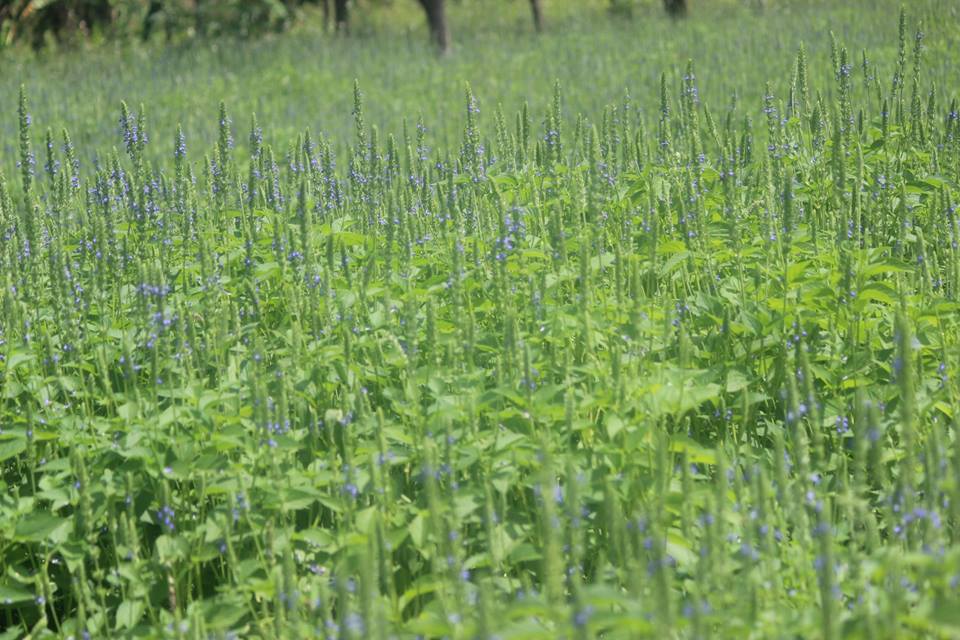
A section of chia crop farm in Busia County. Farmers in the area have been growing the crop among other oil crops such as sesame and soybeans since 2015. Photo courtesy.
Busia Oil Crops Cooperative Society, a group of 700 to 1,000 farmers who persistently grow crops such as sesame (simsim), soybeans and chia among other oil crops are now looking for better markets for their produce after oganisations which introduced and were buying the crops from them opted out.
According to the group chairperson Mr. Dismas Okware Olemnyang, sesame was the first crop to be introduced to the Busia farmers in 2015 by ADRA Kenya, a religious organization which works to improve lives of the less advantaged people in the society.
“The organisation In February came with the seeds which were so new to farmers in this area. Since the crop had never been cultivated by the farmers before, the organisation trained them on the production process and promised to buy the produce from them at Sh200 per kilo,” said Okware.
RELATED CONTENT: Farmers growing Sesame (simsim) have a wide range of benefits
The farmers were motivated given the possible returns in cultivating the crop. They planted the crop in March-April 2015 at the onset of the long rain season and after three months maturity period they would start harvesting.
The first season saw the farmers realise 12-15 tonnes with the highest farmer production 600 kilos from an acre piece of plot.
“Soil in this part of the country is still fertile thus we produce our crops organically as per most markets requirements. The list farmer during this first season produced 200 kilos an acre and all the produce were consolidated at one centre for collection by ADRA Kenya agents,” said Okware.
At the start, the organisation paid farmers the promised Sh200 per kilo but as time went by, they reduced the price to Sh100 per kilo something which did not go well with the producers given producing sesame is labour intensive at it requires Sh15,000-20,000 as capital to produce.
RELATED CONTENT: New sunflower and soyabeans market opens up for Kenyan farmers
This discouraged the farmers who the majority did not turn up to grow the crop in the second season. However, for the few who were persistent had to look for markets in Uganda as the organization bowed out after six months of working with them.
The Uganda Busia Market offers Sh110 per kilo of sesame.
Beginning 2016, a non-government organization approached the farmers to grow the crop for Sh110 pay per kilo but when the crop was ready for market the organisation took 4-5 months to collect the produce and pay the farmers.
“For the second time our farmers were discouraged because of the long wait before being paid their dues as there arose financial hiccups within the organisation,” said Okware.
RELATED CONTENT: Magic chia seeds earns farmer Sh1500 per kilo
Beginning 2017, the group visited a company in Northern Uganda which was processing oil crops. The company introduced them to chia seeds and trained them on the crop production and got most farmers interested to produce it.
This time around, before starting growing the crop the group decided to look for a market for chia seeds first. They approached Momentum Trust, another non-government organosation which has been buying the seeds from farmers in Western Kenya.
The NGO offered Sh150 per kilo of the seeds and has been buying the produce from the group since 2017. However, according to Okware the buying price is too low as compared to what other farmers in the country are earning.
“We have done some online research and even talked to our colleagues in other parts of the country such as Nakuru and Nairobi and the price we get from them ranges from Sh500-1,000 per kilo meaning we are earning less as compared to other growers,” he said.
RELATED CONTENT: European Union to fund over 15,000 coast farmers to grow cashew nuts and sesame (simsim)
The group whose members are currently harvesting chia and also still growing sesame and soybeans are now looking for more and better-paying markets as they have the potential to produce in large quantities and in good quality.
“Our farmers are ready to grow the crop to meet whatever market demands so long as there are good pay and constant market which will not fail us at any point,” said Okware.
Dismas Okware can be reached on +254 714 416499
















Comments powered by CComment